When I was younger, I often felt self-conscious and socially awkward. In fact, one of the reasons I wanted to become a Behavioral Scientist was to be better socially.
If you often feel anxious and embarrassed, this guide is for you. It will give you the tools you need to be more relaxed in social settings, get out of your head and into the conversation.
This guide is for anyone who’s feeling overly self-aware, but examples are geared toward adults in work or at college.
Note: Sometimes, the underlying reason for self-consciousness is social anxiety. If this is the case for you, here’s our list of the best books on social anxiety.
Let’s get started!
1. Focus on someone or something
Self-consciousness comes from being overly concerned with how people see us. We worry that we won’t be seen as smart, attractive, or that others are judging us.
It can be exhausting, and with too little evidence to support the argument in either direction, we go straight to the most negative conclusion.
To get out of this pessimistic mindset, try shifting your attention to the people around you and your environment.
Focus not on what others think of you but on learning about the people you’re with. Make it a point to find out one thing about every person you meet. It could be their job, their major, or what they did on the weekend.
The objective is to get out of your head. Put that energy into the people around you rather than into feeding an inner dialogue that’s holding you back.
2. Question your inner critical voice
It’s easy to believe the negative voice inside our head is always right. But have you tried questioning it? You might find out that it has little to do with what’s real.
Check the evidence from your life:
Can you recall a time you did something that proves your inner critic wrong? For example, if your voice says, “I always mess up around people,” remind yourself of a time when you did just fine.
Ask yourself if what you are feeling is reasonable. Or, are you letting a perception you think others have of you, run the story in your head?
3. Know that people notice you less than you think
In an experiment, students were asked to wear an embarrassing t-shirt.
By the end of the day, the students who wore the shirts estimated that 46% of the class had noticed. When polled, only 23% of their mates actually had.[1] In other words, their embarrassing t-shirt was only half as noticeable as they had thought.
What feels mortifying to us is usually having little to no impact on others. People are caught up in their own thoughts and struggles, too busy to worry about ours. The best thing we can do is remind ourselves that no one cares as much as we do, and even our own filter is not a perfect lens.
4. Know that it’s OK to say some stupid things
I remember talking to a girl I was crushing on when I was in high school. She was talking about how her brother liked a band, and like a crazy person, I said, “Ya, I know.” Like somehow, I knew what group her brother liked. My crush looked at me strangely but kept going.
Did it make any difference to my crush? Not really. At this point, I can laugh about it, but at the time it felt humiliating.
Try turning the tables on the situation. Would you care if someone blurted out something silly? Or would it just pass you by without giving it extra thought? It’s better to talk freely even if you say something stupid every once in a while. The alternative is to always guard yourself, and that can make you come off as stiff and aloof.
5. Don’t try to fight your feelings
Emotions tend to cling harder when we fight them and weaken when we accept them.[2]
When you are anxious, and feeling uncomfortable in a social setting, what are you thinking about? How does thinking about that make you feel? Happy, sad, nervous, jealous? What’s your body doing when you’re in your head and feeling awkward at a party? Are you sweating, jumpy, yawning a lot (a reaction to nerves)?
Simply accept how you feel rather than trying to change it.
Now focus outward. Talk to someone. Ask them how they’re doing. What brings them to this party/event? Do they know anyone? Then check your head. How do you feel when you’re talking to someone? Do you get any less nervous as the conversation goes on? If you were blushing, has it subsided yet?
Practice going back and forth between your inner thoughts and how you feel when you are talking to others. See if you feel better when you’re in your head, listening to your internal dialogue, or when you’re spending your energy on others.
6. Focus on your positive traits
This isn’t “think happy thoughts, and you’ll be fine.” Instead, you want to base your self-worth on your real, positive qualities rather than cynical and questionable self-talk. This is what we know is true:
- You have talents and abilities that give you fundamental value.
- This combination of characteristics makes you unique and memorable.
- You are worth spending time with and knowing.
Try to list your concrete skills like your mathematical ability, you’re a good writer, you’re multilingual, you’re a great cook. Then there are your personality traits. You’re kind, honest, genuine, funny, enthusiastic, etc.
Even if you can’t make a full list today, write one positive quality down every day and then review the list every week. When you have a comprehensive list, read it every day. You’re training your mind to focus on what you do well and to be able to access it quickly.
7. Make sure you’re reading the situation right
Negative experiences can teach us to be on guard and defend ourselves from criticism and hurt. This can affect how we perceive the world and the people we encounter.
Those of us who are overly self-conscious might believe the world will judge us harshly because that is what we’ve experienced. However, as I’ve pointed out, people don’t care that much about how we act or what we say. Every new person you meet thinks of you as a blank slate.
When you’re in a scary social situation, ask yourself, “Is there a chance my past experience is affecting how I’m seeing this interaction? Is there another, more realistic way I can approach his conversation?”
Believe people will be friendly, and most of the time, they will be. If not, it says more about them than you.
8. See yourself as a social observer
People watching is fascinating, and it shows us how our basic humanity makes us all messy, foolish, and funny. Go to the mall, grab a coffee/tea, and watch people walk with their friends. Listen in as they sit beside you and talk, or as they chase their kids down the hall.
Now notice their body language, their tone of voice, and eavesdrop on what they’re saying. What we’re doing is training you to switch your focus from yourself to others and to think objectively about what you’re witnessing.
Are people relaxed or stilted? Is their posture good, or are they slouching? When they talk, are they quiet, or does the volume go up and down with excitement? The more we see others being their imperfect selves, the more we’ll realize this is what ‘normal’ looks like.
Go into this observer mode when you walk into a room of strangers. It can help you be less self-conscious.
9. Assume that people will like you
This one is about the mechanics of being seen as confident rather than inhibited or self-conscious. When we feel uncomfortable, it can make us talk softer, hug our bodies with our arms, and speak faster to get the words out and move the focus off us as soon as possible. It can make us seem aloof, and even if we don’t intend to, it makes us less approachable.
Be confident and friendly right off the bat. Walk up to people with a warm smile and present yourself. If you’re uncertain about the details, look at how likable, confident people do it and learn from them. Assuming people will like you is a self-fulfilling prophecy. Assuming they won’t is, too.
10. Ask about others to take the focus off you
It’s easier to focus on someone else other than ourselves. When you meet someone for the first time, ask them what they do for fun. What are their hobbies, or do they have any pets? Listen carefully, nod, and give them signs that you are enjoying their story. Then add anything relevant that applies from your life. Things like your pets – what kind are they, their name, breed…or your hobbies. At the end of the day, you want to have a balance between learning about them and sharing about yourself.
The goal is to learn about someone else because it’s hard to be self-conscious when you’re focused on getting to know another’s interests and stories.
11. Make internal progress checks, not comparisons
Jealousy is a miserable emotion. It makes you feel small and worthless and sucks the joy out of everything. It’s like anger directed at someone else, but you are the one who feels crappy.
Avoid both overexaggerating someone else’s talents or trying to find flaws in them to make yourself feel better. No one is perfect, and tearing them down when you feel envious just retains the focus on you because you are still comparing yourself to someone else.
Here’s a thought: What if we were OK with the fact that someone is more accomplished than us? When we accept this, it helps us see ourselves differently.
Our value then has nothing to do with how successful we are or how good we are at something. We want to go from “I like myself because I’m good at…” to “I like myself.” (Period.) This makes our self-acceptance unconditional.
How do we accept that others are more accomplished than us and be OK with that? First, let that fact sink in, and allow all your emotions of envy and sadness to come to you. Accept those emotions rather than fight them. Now, you no longer need to fear them. Afterward, you will be less prone to comparisons.
Here’s another way to do it:
Instead of thinking, “Well, at least I’m better than them when it comes to X.” Say, “I’m not good at everything, which is OK because my value isn’t based on my achievements. I have value because I am 100% myself”.
Let’s talk more about how to be more self-accepting…
12. Practice accepting yourself
Self-acceptance is one of the biggest steps we take towards achieving self-confidence.
According to Aaron Karmin, MA, LCPC, a psychotherapist in Chicago, Ill, a person “who accepts [themselves] unconditionally as a worthwhile human in spite of [their] faults and imperfections does not experience the stress of self-consciousness.”.[3]
Here are some things you can do to accept yourself:
- Decide how you are going to live your life. Will you let others define your personal image, your strengths, and your weaknesses? Try to move from blame, doubt, and shame to tolerance, acceptance, and trust.
- Make a list of all your good points.
- What do you do well?
- What are you proud of accomplishing?
- Whose lives have you made better?
- Connections you’ve made with others.
- Hardships you have overcome.
Review the list often, so you see your progress and acknowledge your gifts.
- Take an inventory of the people close to you.
- Are they good for you?
- Do they reinforce negative self-talk?
- Do they criticize or demean you?
Consider eliminating all the negative influences in your life.
- Surround yourself with a positive support group of people who celebrate you.
- Forgive yourself. If you made a mistake, realize you did your best with the information you had at the time, or you simply made a bad choice. But now you chose to move on and forgive yourself.
- Silence your inner critic. Just because it’s hard to hear doesn’t mean it’s right or 100% true. If you wouldn’t talk to someone else like you speak to yourself, why is it OK to do it to you? You’re human like everyone else. Treat yourself as well as you treat anyone else, if not better.
- Move on from your unrealized dreams. You can’t change the past. All you can do is move forward and continue to pursue your current goals.
- Help yourself see how you make others’ lives better. It’s harder to see yourself in a harsh light when you acknowledge all the good you do.
- Let it go – You can’t control everything. It’s not resignation. It’s a realization that your energy is better spent elsewhere instead of railing against the things you can’t change.
- Try to solve your problems one at a time. First, step outside your head where all the worry and self-doubt resides. Take a dispassionate look at what you need to do to move past each issue. You could even try imagining that the problems you’re facing are someone else’s (if that helps you get away from your internal thoughts). Ask yourself what advice you’d give them (yourself) to help?
- Practice Self-compassion – accept your flaws and love yourself anyway. Simple words, but for most of us, it takes years, if not a lifetime to master this step. The more you do it, the better you’ll get in every respect.
- Even though you may not have much experience being kind and compassionate with yourself, you will start to believe these good things you’re telling yourself. Especially if you keep this positive internal monologue up. In many instances, it took years to get to this place of insecurity. It will likely take weeks and months to see progress and make permanent changes to your mental habits.
13. Practice thinking about other’s needs
Try doing thoughtful things for others. Consider their struggles, worries, dreams or regrets. When you do, you take the focus off yourself and you’ll connect with them. This will help you be less self-conscious.[4] It will also show others that you are caring, and you value them. Done selflessly, it will bring good things back to you.
Here are some suggestions:
- Smiling at someone after you meet them. It could be a friend, family member, or acquaintance. Let the smile happen as you talk to them, so they know you are smiling just for them because it grows after you say, ‘Hi.’
- Hold a door for someone.
- Give a spontaneous compliment.
- Bring a friend or co-worker cookies or a pre-made dinner if they are sick or need a pick-me-up.
- Pay it forward. Pay for the coffee or drive-thru meal of the people behind you.
- Keep your area tidy and organized if you work in an open-concept office.
- Send cards for different occasions or for no occasion at all.
- Give someone 100% of your attention and note what they say so you can follow up later. (Ask them how ‘it’ went. Make sure they are OK afterward.)
- Consciously spend a few minutes every day thinking of the things you are grateful for.
A word of caution: Do not do these things to gain others’ approval. That puts the focus back on you. Do it out of sincere consideration for others. The purpose of the exercise is to focus on others and their well-being. When you do, you’ll become more compassionate and less self-conscious.
14. Consider talking to a Therapist
If your self-consciousness is inhibiting you or is a result of social anxiety, a therapist can be helpful. Having social anxiety is more common than we think, and deciding to understand and address the effect it has on your life is brave. A Psychologist or a Therapist will help you talk through your feelings, find out where they originate from, and give you the tools to unpack them and move forward.
We recommend BetterHelp for online therapy, since they offer unlimited messaging and a weekly session, and are cheaper than going to a therapist's office.
Their plans start at $64 per week. If you use this link, you get 20% off your first month at BetterHelp + a $50 coupon valid for any SocialSelf course: Click here to learn more about BetterHelp.
(To receive your $50 SocialSelf coupon, sign up with our link. Then, email BetterHelp’s order confirmation to us to receive your personal code. You can use this code for any of our courses.)
You can also try contacting your insurance company or doctor for recommendations.
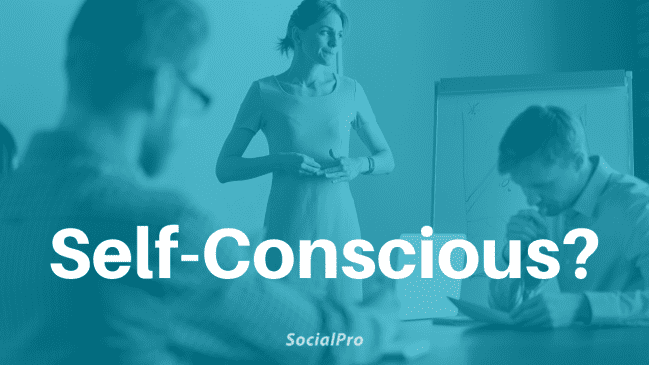





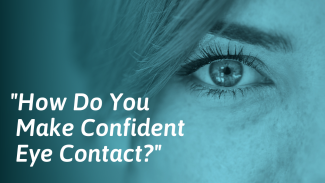
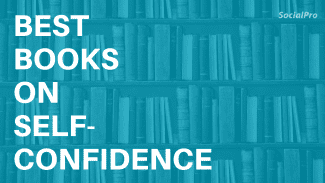
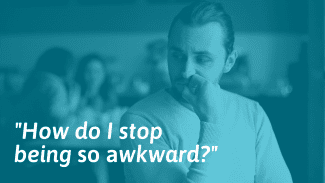

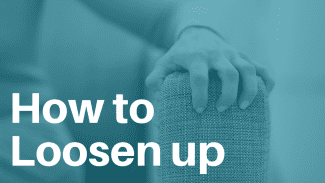
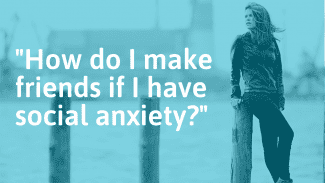
Thanks David!
I’m finding your content really helpful and insightful!
Cheers
PAC
I am always overthinking and strongly believe everyone is judging me.This makes me very nervous among strangers. I am afraid to make mistakes so sometimes I refuse to speak or act.
So I’m my life I’ve moved a ton even though I’m only in high school and it’s been pretty hard for me. At my first school I had friends and was still pretty shy but I was comfortable. I usually was the one left out of things. I moved in the middle of the school year and had to leave the place I was most comfortable being myself. I started school in another state and I was super nervous. I really wanted to make some new friends but I was too scared to talk to anybody. I thought that they would think I’m weird or find what I say boring. I try to be funny but I guess I’m just not a super funny person. I became super self conscious about the way I act and talk. I made friends and they are super nice but I still was super quiet and was fine if I didn’t talk most of lunch. It was better towards the end of the year but whenever none of them came to school I never felt comfortable enough to go sit by anyone else. When that happened I would usually leave for lunch (since we ha open campus) and go find somewhere where no one would see me by myself. I finally was comfortable talking and hanging out with my friends but then my family decided to move AGAIN. I got super scared again having to start over and meeting new people. I’ve been trying to force myself to be more social by going to certain school and church activities. Whenever I get into a group of people I feel judged. I’ve been having a positive attitude about meeting new people and I think that it calms me down and helps. I’ve made some really nice friends who I hope I can become more comfortable around. School starts next week and I’m really not ready to start over again but hopefully this will be a really good year.
I’m afraid of talking in front of people.I am fearful of not being intelligent enough to hold a conversation. I feel scared when people ask me an opinion about a particular thing but my answer is not up to their expectations. I know that everyone is unique and has a way to look at things but at times I feel like I do not know what I am doing. Sometimes I feel that being socially interactive with people is very stressful.
My friend when you’re around people like that just listen and ask questions. If someone has more knowledge than you it’s always smart to just listen and ask questions. Then they will see ur not done idiot who’s just standing there and not interacting or asking questions. If you dint know something tiny simply dint know it. It doesnt make you stupid. Life is all about learning. Be curious and ask questions and yiy will be fine and fit in perfect. Alit of people over think. But if you feel like it’s too much leave the room. Anyone who pushes anyone for not knowing something g is an a class asshole. I personally like to learn things myself and show initiative. I hate learning from others always have. That’s why my communication skills are bad I really just order my own company. But if I’m forced into a SoCal situation I just hold my head up and be strong. I honestly dont like most people… unless I have aknwthi g in common. Just live ur life and be urself good luck
I have recently transferred to a new high school and I had been kind of nervous how it would be atound new people but morover I was excited to meet new faces. My past hadn’t been too flattering to think about and I was confident that I would give my self a kick-start. But it wasn’t that truthful. I had made a lotof friends in the early semester but I got loosened up in the coming days and the same past flashed in my mind, I just couldn’t help myself overcone the negativity and I started finding faults in everyone which lagged me behind even. And today I think I am still there. from where I started and that is making me fall down even more…
I have all the insecurities known to man kind.
I’m afraid when I talk to someone they’ll judge what I say or maybe what I’m wearing or how I look. I’m always sitting alone not talking to anyone for those reasons I always overthink things, and I’m afraid they might think of me as a weird person.
Im afraid of being judged by people about what i say, maybe its wrong, maybe they dont like what im saying, maybe they dont understand me. Im afraid of awkward scilences. I tend to get nervous sometimes when i speak to people and realise they are looking at me because i dont know what they think of me at the same moment. It is so complicated
Same
I’m afraid of being judged for being my self and talking to people who I don’t know. I hope that I wont be afraid for a long time anymore.
I am chubby and I am bad at cracking jokes. I’m afraid people will laugh at my physique and the fact that I am so lame.
I am fearful of not being intelligent enough to hold a conversation. Having stopped smoking, I have gained weight. I feel over conscious of my size and people judging me for how I look. I have all the insecurities known to man kind.
I lose my train of thought trying to listen to the conversation because while someone is talking I’m trying to think of a follow-up response for after they stop talking.
I am afraid I will say something wrong and something boring without humor
I am afraid of being too loud. To little movements like just opening my bag to flipping a page on my book.
I have been afraid that people will think I am inadequate. I have been afraid people will think I am not smart or that I am awkward. I have been afraid people will see the real me and decide I’m not worth getting to know or they will use that information to hurt me later on.
I am a emotional guy you know and also gay,which makes the things worst.i was afraid that i am being judged for the way i talk( because my tone is soft and low).i always think that my friends would misunderstand me,do not feel happy for my jokes and as if i am a distant one,not even sharing their slice of life,but also i understand everything in late,which i thought might annoy them.
I’m afraid that my story won’t make sense or I will forget key points or mess up facts. I’m afraid they will come back with a question that I won’t know the answer to. I’m afraid they will ask me my opinion on something that is controversial and if I answer truthfully, they will judge me because I know it’s different from their values and opinion
I’m a big guy. Always have been. I’m so anxious in public settings and think constantly of how others view me. I diligently watch what clothes I wear to make sure I look the best I can even for a quick run to the gas station.
It’s great that you make the effort to look good. It’s even better when it’s because you’re happy about yourself and want to express that, rather than fear negative opinions from other people.
I’m scared that judged by anything that I do or say.
When I’m at work esp meetings, I feel like one of these guys / gals is waiting for me to slip up and show weakness, sometimes even when I don’t know what I’m talking about I still try to make it like I do, just so someone doesn’t get the chance to latch onto an opening that can be used against me to create weakness if ones not already there…but there are many, just hidden quite well!.
I’m ok with being wrong so long as its properly addressed with respect, not used as a tool to put you in a box….
Everytime i leave my house often when i go on my walks, i tend to try to look like im not aproachable and i try to look bored so People don’t try to talk to me because i just wanna melt in the background. More than often if you are speaking to me you will notice that im really nice and kind but i don’t want people to know that if im trying to make myself hidden in public. And now i really can’t branch out of it so when i see attractive girls im kind of just awkward and it sucks. Meh:(
I’m scared people will find me to be just a boring housewife. I also don’t want to be seen as intrusive or nosy, so I never ask personal questions, even if the other person has volunteered some personal information.
i am afraid if people think stupid of me because of whatever i say. i feel like they are constantly talking negative about me and i am ot the one to be liked .
I have too many fears to count. I’m afraid of being judged as inadequate. I’m afraid of being labeled as stupid, boring, mean, and too ugly to love. No matter how much I have in common with others it just doesn’t seem to be good enough. No one ever remembers me. No one ever cares when I’m around or when I’m gone. People have told me if I want to connect with others just to be myself. But how can I be myself when no one seems to like the “real” me? This has created a circle of doubt. It makes me look at past, present, and future relationships as something that’s not meant for me. This has made me stuck. I can’t move on and it’s hurting me a lot in life.
Things get better as you get older? Well, not for me it doesn’t.
Hi Hope,
I also have some of the same fears. I could’ve wrote the first 3 lines verbatim. Just wanted to share you are not alone. I’ve been working on healing my “not good enough” fears. I’m 45 and my social anxiety has gotten better from when I was younger. I remember a red blush that would come from grade school through my 20s. Sometimes, though, when I’m in a fearful place, it seems like it will never get better. I have to say I have made progress, though. I think there is hope. Just watching the video about O.F.C. helped me to go to an event yesterday and it turned out to be pleasurable. I wish the best for you!
I feel I do not have any ideas / information to share. Is is due to the fact that i m constantly worried about what others think of me if i dont speak
I am afraid of being judged by other people for everything I say, how I speak and sometimes even what I look like
I’m afraid that people will reject me if I start a conversation with them or even if I just say hello. Then I get into my head and am self conscious about everything I say and do, worried that I’m being awkward and the other person won’t like me and worried that I’ll run out of things to say or ask which usually ends up happening. When people walk by I do have the urge to say something but I usually don’t because I say to myself that it’s not necessary.
How I look, if I sound stupid and I just worry that they won’t like me.
How I look; does what I’m saying sound right? General fear of being wrong or looking stupid and feeling inadequate.
Hi,
It seems that am in my head a lot and fearful that what I say will not be meet with a reply. It usually is not, which leads to the next fearful thought and the next. I have a concern with not being smart enough and seem to be corrected a great deal of the time by others. I challenge myself to open up and have been successful on occasion but then dont know how to take this to the next level, which leads to distance between the person. Most think I am standoffish which is so uncomfortable. There is a great fear of eating lunch at work as end up being left on the sideline. Its so uncomfortable as others approach the table, see me and find a different place to sit.
Hi Mary,
I notice that instead of sitting near people and talking with them, I will feel more comfortable sitting in a seat a bit away by myself. I read somewhere that this was helping me to stay isolated. On occasion, I’ve challenged myself to ask if I could sit near someone or just sit down beside someone. Progress, not perfection! I also feel that I’m not smart enough or get tongue-tied with what to say. I like the O.F.C. approach that I watched a video on. It helped me get out of my head and that really helped with the awkwardness. I wish you the best!
I’m afraid of making people feel uncomfortable by trapping them in a conversation that is forced and awkward. So I end up keeping my head down and pretending that I didn’t see them. This makes the situation worse because I end up not saying anything and people think I’m rude. It’s especially bad with people who I know on a surface level, because they would expect you to say something to them, but I don’t know what to talk about so I stay silent. I guess that’s what I struggle with the most, those quick casual conversations you have when you bump into people you know for a short time. My brain just can’t come up with something to say in time, and it ruins the moment.
I feel this exact same way almost every day. I am constantly in the position where I casually cross paths with someone, and one would expect a minute or two of small talk, but my mind goes completely and utterly blank. My instant fixation on how they will perceive me, overpowers my ability to think of anything else. Or other times, I can think of things to say, but the uncertainty of how they will be received prevents me from saying them. Either way, the result is usually awkward silence. I exert so much brain power filtering what I could say, I’m just left speechless.
Similar problems exist when it comes to sharing opinions. I’m afraid if they don’t agree with me, I won’t be able to defend my view point, or will make a fool of myself trying. I often feel I don’t have the conversation skills to enforce my opinions in real time. My overarching fear is that whatever I say, or however I manage to say it, will lead to the perception that I am awkward, rude, boring, have poor social skills, or lack friends. In reality I don’t think I have any of these problems, but my behaviour that results from these fears seems to display exactly what I’m afraid of. It’s a ridiculous downward spiral. So far the only thing that has helped me reduce this is the realization that coming across as silent and rude is worse than coming across as awkward, so might as well settle for awkward. Lately I’ve been speaking more, at the risk of embarrassing myself. While what I say sometimes still embarrasses me, it seems to be less so every time. I have a little more confidence in what I say every time, which corresponds to less awkwardness, and thus less fear of being awkward the next time. It almost seems possible the downward spiral can be put in reverse, if one is willing to take a few first leaps.